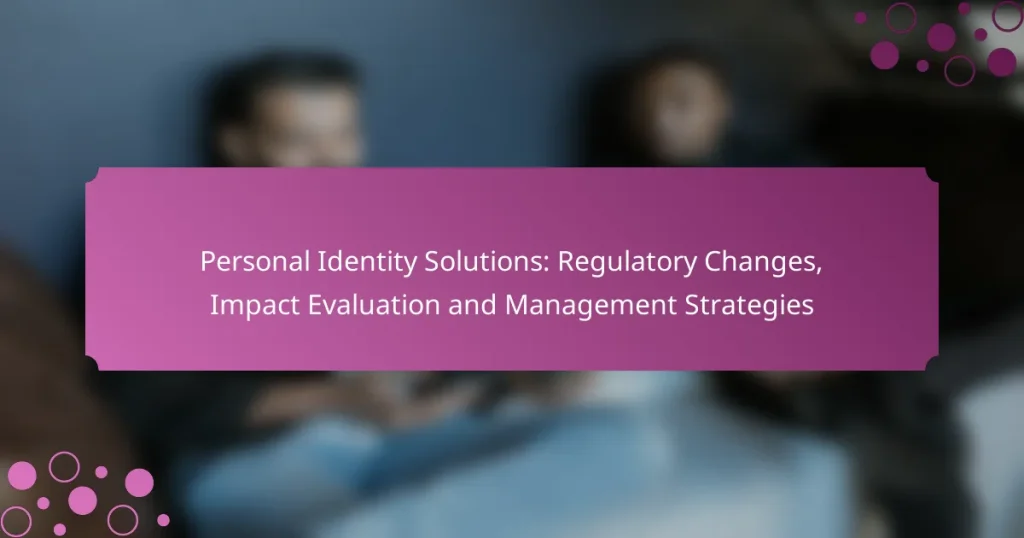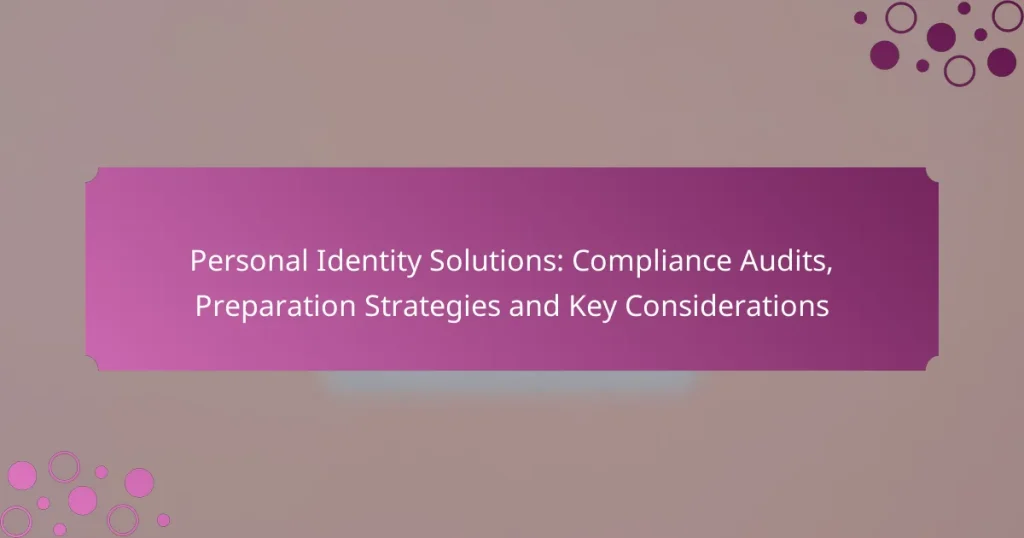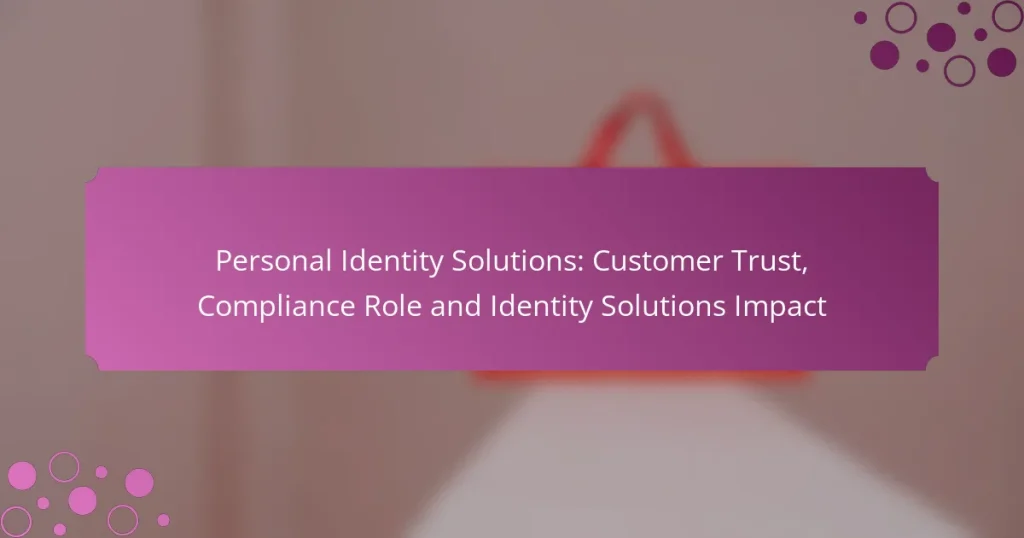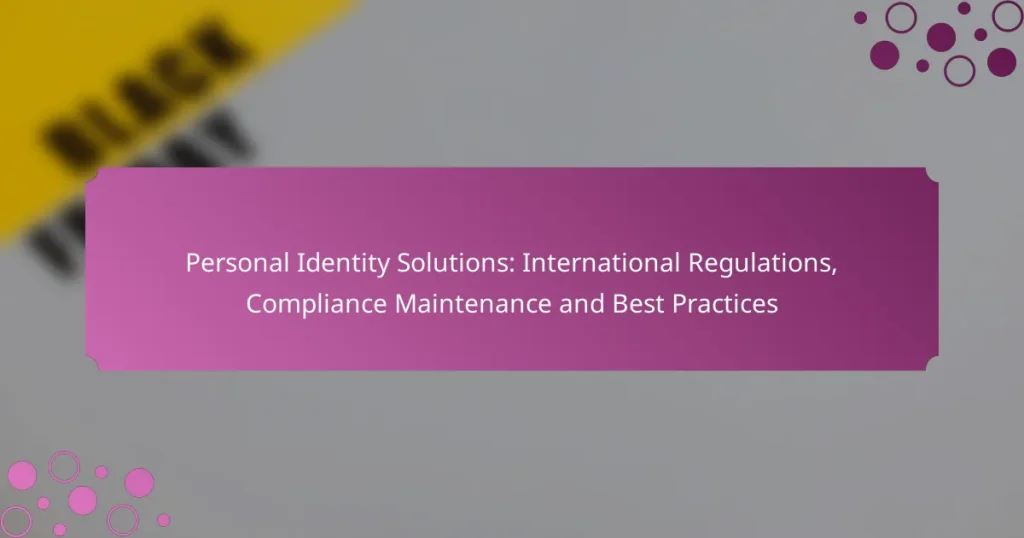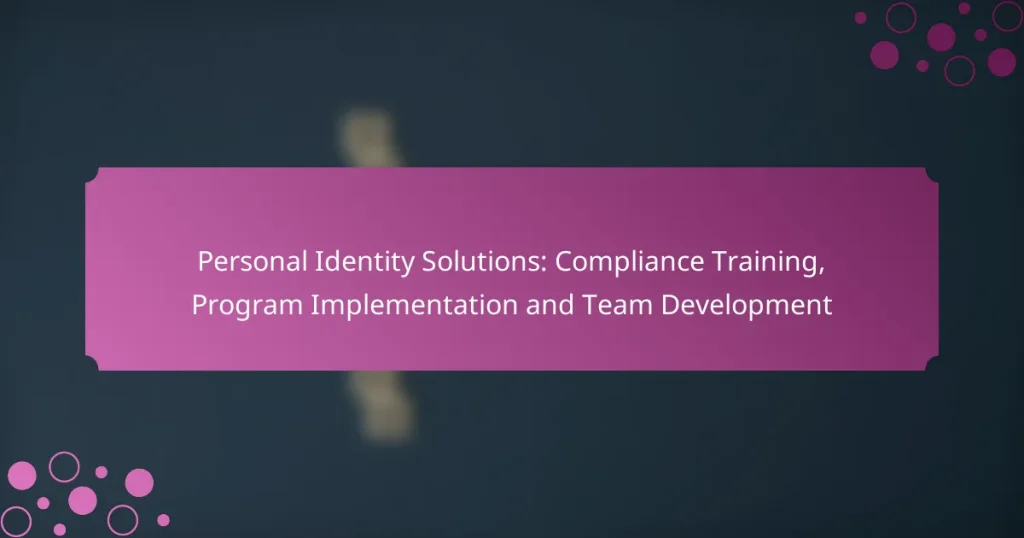Personal identity solutions play a crucial role in ensuring regulatory compliance for organizations in the UK, particularly in relation to identity verification and data protection. By integrating legal requirements such as the General Data Protection Regulation (GDPR) into their processes, these solutions help maintain trust and security while effectively safeguarding personal information.
Personal Identity Solutions: Compliance Audits, Preparation Strategies and Key Considerations
Personal Identity Solutions: CCPA Implications, Compliance Requirements and Management Strategies
Personal Identity Solutions: Customer Trust, Compliance Role and Identity Solutions Impact
Personal Identity Solutions: International Regulations, Compliance Maintenance and Best Practices
Personal Identity Solutions: Compliance Navigation, Financial Sector Challenges and Best Practices
Personal Identity Solutions: Compliance Training, Program Implementation and Team Development
What are the personal identity solutions for regulatory compliance in the UK?
Personal identity solutions for regulatory compliance in the UK include various services and tools designed to help organizations meet legal requirements for identity verification and data protection. These solutions are essential for maintaining trust and security in business operations while adhering to regulations such as the General Data Protection Regulation (GDPR).
Identity verification services
Identity verification services are crucial for ensuring that individuals are who they claim to be. These services typically involve checking personal information against official databases, such as government-issued ID records or credit bureau data. Companies in the UK often use these services to comply with Know Your Customer (KYC) regulations.
When selecting an identity verification service, consider factors such as speed, accuracy, and integration capabilities with existing systems. Many providers offer real-time verification, which can enhance customer experience while reducing fraud risk.
Data protection management tools
Data protection management tools help organizations manage and protect personal data in compliance with regulations like GDPR. These tools often include features for data mapping, risk assessments, and incident response planning. They enable businesses to identify where personal data is stored and how it is processed.
Implementing a data protection management tool can streamline compliance efforts and minimize the risk of data breaches. Look for tools that offer user-friendly dashboards and reporting capabilities to monitor compliance status effectively.
Compliance consulting firms
Compliance consulting firms provide expert guidance on navigating regulatory requirements related to personal identity solutions. These firms can help organizations develop and implement compliance strategies tailored to their specific needs and industry standards.
Engaging a compliance consulting firm can be particularly beneficial for businesses lacking in-house expertise. They can conduct audits, provide training, and assist in the development of policies and procedures to ensure ongoing compliance with UK regulations.
How do personal identity solutions ensure compliance?
Personal identity solutions ensure compliance by integrating regulatory requirements into their processes and technologies. These solutions utilize data protection frameworks and risk management strategies to align with legal standards, safeguarding personal information effectively.
Adherence to GDPR regulations
Adhering to GDPR regulations is crucial for any personal identity solution operating in the European Union. This involves implementing measures such as obtaining explicit consent from users, ensuring data portability, and allowing individuals to access or delete their personal data. Regular audits and updates to privacy policies help maintain compliance as regulations evolve.
For example, companies must provide clear information on how personal data is collected and used, often through privacy notices. Non-compliance can result in hefty fines, typically reaching up to 4% of annual global turnover or €20 million, whichever is greater.
Risk assessment and mitigation
Risk assessment and mitigation are vital components of compliance in personal identity solutions. Organizations should conduct regular assessments to identify potential vulnerabilities in their data handling processes. This includes evaluating the security of data storage, transmission methods, and access controls.
To mitigate risks, companies can implement encryption, multi-factor authentication, and employee training on data protection best practices. Establishing a clear incident response plan is also essential, ensuring that any data breaches are addressed swiftly to minimize impact and maintain compliance with regulations.
What are the key regulations affecting personal identity solutions in the UK?
The key regulations impacting personal identity solutions in the UK include the General Data Protection Regulation (GDPR) and the Data Protection Act 2018. These regulations set the framework for how personal data should be handled, ensuring privacy and security for individuals.
General Data Protection Regulation (GDPR)
The GDPR is a comprehensive data protection law that applies to all organizations processing personal data of individuals within the European Union, including the UK. It mandates that organizations must obtain explicit consent from individuals before collecting or processing their personal data.
Key principles of GDPR include data minimization, accuracy, storage limitation, and accountability. Organizations must ensure that personal data is relevant and limited to what is necessary for processing purposes.
Failure to comply with GDPR can result in significant fines, potentially reaching up to 4% of annual global turnover or €20 million, whichever is higher. Regular audits and staff training are essential to maintain compliance.
Data Protection Act 2018
The Data Protection Act 2018 complements the GDPR and provides specific provisions for data processing in the UK. It establishes the Information Commissioner’s Office (ICO) as the regulatory authority overseeing data protection compliance.
This act includes additional rules regarding the processing of sensitive personal data, such as health information and biometric data. Organizations must have a clear legal basis for processing this type of data, often requiring explicit consent.
Organizations should implement robust data protection policies and practices to comply with the Data Protection Act 2018. Regular training and awareness programs can help staff understand their responsibilities under this legislation.
How to choose a personal identity solution provider?
Choosing a personal identity solution provider involves assessing their capabilities, certifications, and client feedback. Focus on their service offerings, industry certifications, and testimonials to ensure they meet your compliance needs.
Evaluate service offerings
Start by examining the specific services offered by potential providers. Look for features such as identity verification, fraud detection, and data protection measures. Ensure that their solutions align with your regulatory requirements and business goals.
Consider the scalability of their offerings. A good provider should be able to accommodate your growth, whether you are a small business or a large enterprise. Compare different providers to see which ones offer the most comprehensive and flexible solutions.
Check industry certifications
Verify that the identity solution provider holds relevant industry certifications, such as ISO 27001 or GDPR compliance. These certifications indicate that the provider adheres to recognized standards for data security and privacy.
Additionally, check for compliance with local regulations, such as the CCPA in California or the UK’s Data Protection Act. Ensuring that the provider meets these legal requirements can help mitigate risks associated with data handling.
Assess client testimonials
Client testimonials can provide valuable insights into the effectiveness and reliability of a personal identity solution provider. Look for reviews that highlight the provider’s strengths and any potential weaknesses.
Consider reaching out to current or past clients for direct feedback. This can help you gauge the provider’s customer service, responsiveness, and overall satisfaction. A provider with a strong track record of positive client experiences is often a safer choice.
What are the costs associated with personal identity solutions?
The costs associated with personal identity solutions can vary significantly based on the service provider and the features included. Generally, these costs fall into two main categories: subscription fees and one-time setup costs.
Subscription fees
Subscription fees are recurring charges that users pay to access personal identity solutions. These fees can range from around $10 to $50 per month, depending on the level of service and features offered, such as identity monitoring and fraud protection.
When selecting a subscription plan, consider the specific services included, such as alerts for suspicious activity or insurance against identity theft. Some providers may offer discounts for annual payments, which can reduce overall costs.
One-time setup costs
One-time setup costs are initial fees required to establish a personal identity solution account. These can vary widely, typically ranging from $50 to $200, depending on the complexity of the service and any necessary identity verification processes.
Be aware that some providers might waive these fees during promotional periods or for bundled services. Always read the fine print to understand what is included in the setup cost and any potential ongoing fees that may apply after the initial setup.
What are the benefits of using personal identity solutions?
Personal identity solutions offer enhanced security and improved customer trust, making them essential for businesses handling sensitive information. By implementing these solutions, organizations can better protect user data and foster a reliable relationship with their clients.
Enhanced security
Enhanced security is a primary benefit of personal identity solutions, as they help prevent unauthorized access to sensitive information. These solutions often utilize multi-factor authentication, biometric verification, and encryption to safeguard data.
For example, a company might implement a biometric system that requires fingerprint or facial recognition for access to secure areas or information. This significantly reduces the risk of identity theft and data breaches, which can be costly and damaging to a company’s reputation.
Improved customer trust
Improved customer trust is another key advantage of personal identity solutions. When customers know their personal information is protected by robust security measures, they are more likely to engage with a business and share sensitive data.
Businesses can enhance trust by clearly communicating their security practices and compliance with regulations such as GDPR or CCPA. Regularly updating customers about security measures and any potential threats can further solidify this trust, leading to increased customer loyalty and retention.
What are the challenges in implementing personal identity solutions?
Implementing personal identity solutions presents several challenges, including regulatory compliance, data security, and user acceptance. Organizations must navigate complex regulations while ensuring that identity solutions are secure and user-friendly.
Regulatory Compliance Issues
Regulatory compliance is a significant challenge when implementing personal identity solutions. Organizations must adhere to various laws and regulations, such as GDPR in Europe or CCPA in California, which dictate how personal data should be collected, stored, and used. Non-compliance can result in hefty fines and reputational damage.
To ensure compliance, businesses should conduct thorough assessments of their identity solutions against applicable regulations. This includes reviewing data processing agreements and ensuring that users have provided informed consent for their data usage.
Data Security Concerns
Data security is critical in personal identity solutions, as these systems often handle sensitive information. Organizations must implement robust security measures to protect against data breaches and unauthorized access. This includes encryption, secure access controls, and regular security audits.
Additionally, organizations should consider adopting multi-factor authentication (MFA) to enhance security. MFA adds an extra layer of protection by requiring users to verify their identity through multiple methods, reducing the risk of unauthorized access.
User Acceptance and Trust
User acceptance is another challenge in implementing personal identity solutions. Users must trust that their personal information is handled securely and responsibly. Building this trust requires transparent communication about how data will be used and the measures in place to protect it.
Organizations can improve user acceptance by providing clear privacy policies and offering user-friendly interfaces. Engaging users in the development process and addressing their concerns can also foster trust and increase adoption rates.
